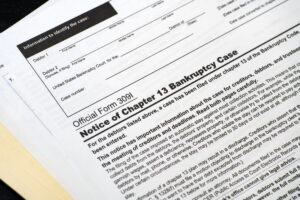Sometimes, even the best laid plans go wrong. It isn’t unusual for a debtor to find himself unable to complete his Chapter 13 plan as it was originally proposed. Fortunately, the Bankruptcy Code offers some flexibility to deal with that possibility. If a debtor finds himself in that situation, he should consider one of the four following options:
- Hardship Discharge – The Bankruptcy Code allows a debtor to receive a hardship discharge if he finds himself in circumstances that make it impossible to complete the plan. One example might be a drastic reduction in income as a result of disability. A hardship discharge will only be granted where unsecured creditors have received as much under the plan as they would have received in a Chapter 7 liquidation bankruptcy.
- Modification – A debtor may request a modification to reflect his changed financial circumstances, as long as it meets the requirement of a Chapter 13 plan.
- Conversion to Chapter 7 – The debtor has an absolute right to convert a case to a Chapter 7 case. Such a debtor must be prepared to explain his change in financial circumstances, however.
- Dismissal – While a seemingly drastic option, it may make sense if the case may be converted to a Chapter 7 against his will and there is non-exempt property that could be liquidated.


